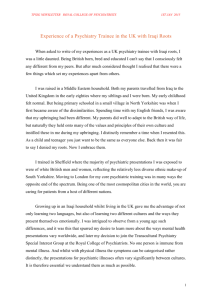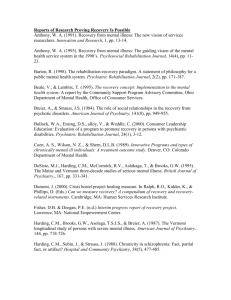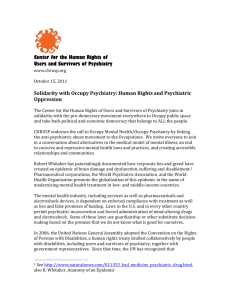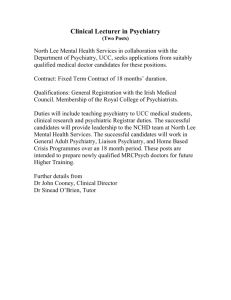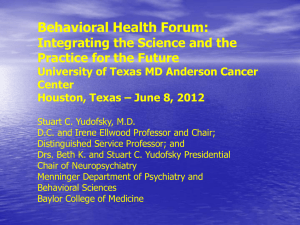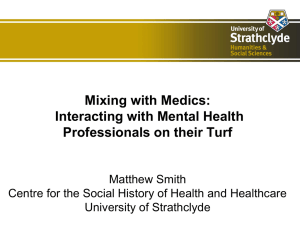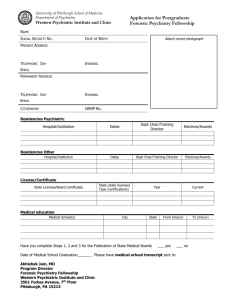Dan Blazer by Andrea Tone
advertisement
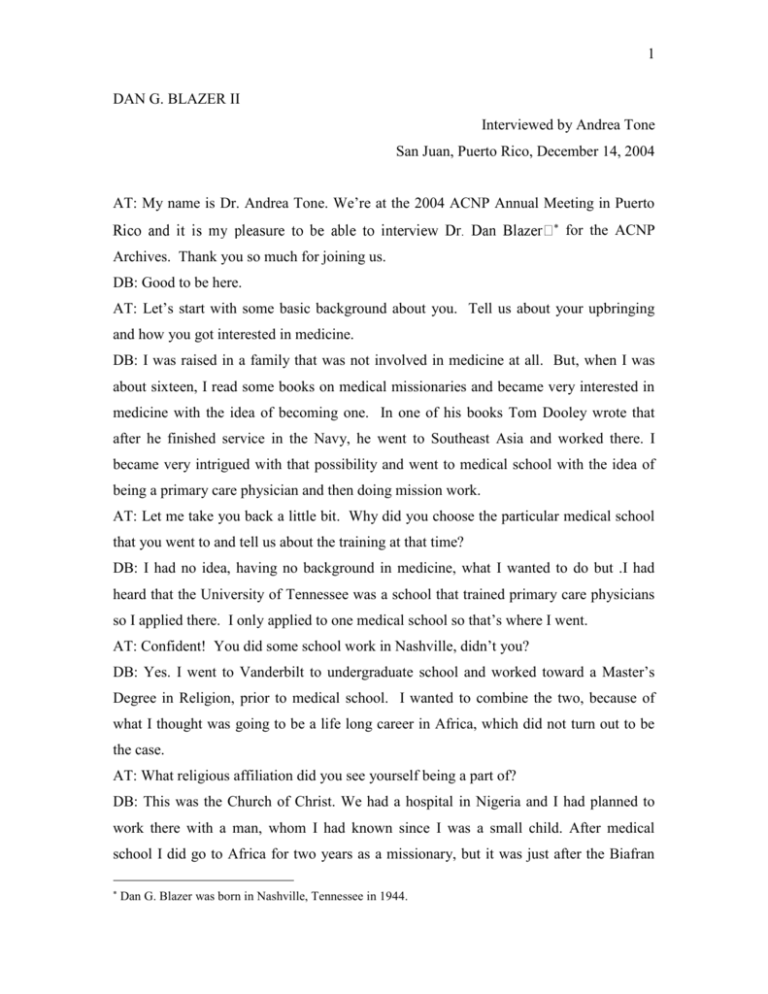
1 DAN G. BLAZER II Interviewed by Andrea Tone San Juan, Puerto Rico, December 14, 2004 AT: My name is Dr. Andrea Tone. We’re at the 2004 ACNP Annual Meeting in Puerto for the ACNP Archives. Thank you so much for joining us. DB: Good to be here. AT: Let’s start with some basic background about you. Tell us about your upbringing and how you got interested in medicine. DB: I was raised in a family that was not involved in medicine at all. But, when I was about sixteen, I read some books on medical missionaries and became very interested in medicine with the idea of becoming one. In one of his books Tom Dooley wrote that after he finished service in the Navy, he went to Southeast Asia and worked there. I became very intrigued with that possibility and went to medical school with the idea of being a primary care physician and then doing mission work. AT: Let me take you back a little bit. Why did you choose the particular medical school that you went to and tell us about the training at that time? DB: I had no idea, having no background in medicine, what I wanted to do but .I had heard that the University of Tennessee was a school that trained primary care physicians so I applied there. I only applied to one medical school so that’s where I went. AT: Confident! You did some school work in Nashville, didn’t you? DB: Yes. I went to Vanderbilt to undergraduate school and worked toward a Master’s Degree in Religion, prior to medical school. I wanted to combine the two, because of what I thought was going to be a life long career in Africa, which did not turn out to be the case. AT: What religious affiliation did you see yourself being a part of? DB: This was the Church of Christ. We had a hospital in Nigeria and I had planned to work there with a man, whom I had known since I was a small child. After medical school I did go to Africa for two years as a missionary, but it was just after the Biafran Dan G. Blazer was born in Nashville, Tennessee in 1944. 2 War; the political situation was very unstable, and so I had to return. At the time I was beginning to get interested in psychiatry but the experience in Africa also led me to develop a very strong interest in public health and epidemiology. AT: Tell us a little bit about what it was like to be a medical missionary. I think people watching this tape would be interested to learn more about this. DB: In some ways it was fascinating and in some ways it was very boring. It was fascinating to be in another culture. We were very isolated. This was prior to cell phones, to e-mail, to television. Where we were located we had electricity and shortwave radio, but beyond that, we were pretty isolated although I had a wife and child at the time. AT: They went with you? DB: They came with me. AT: Wow! DB: We went with a small team and worked in a mobile clinic, not in a hospital, most of the time. I drove a Land Rover, five days a week to different villages with a nurse, a pharmacist and a couple of other people. We set up a clinic and saw somewhere between one hundred fifty to four hundred patients a day then turned around and drove back. AT: So, you don’t have any sympathy for the doctors today that say, “Oh, I have to see too many patients”? DB: Well, I have some sympathy for them if they want to talk to their patients, because we really had almost an assembly line. That was the part that was somewhat boring. We had very little time to talk because of the burden of care that was necessary. I did learn the language, a variety of English, which they call “Pidgin” English, but it was very hard to converse for any length of time. We had no doubt that we were doing something good. We treated a lot of infectious and parasitic diseases but we also encountered things we couldn’t treat at all. Interestingly, we saw very few psychiatric problems, but the ones we did see we could do nothing about. AT: What were the kinds of psychiatric problems you saw? DB: We would see some very psychotic disorders including a few severe postpartum psychoses, and schizophrenia more frequently. We did not see much depression probably because we were not looking for it. Those individuals probably would not have come to 3 our clinic. Because we were treating physical illnesses they went to native healers to get psychiatric care, so we were invisible to that group. AT: What did you do when patients presented with schizophrenia or postpartum psychosis? DB: We had a little antipsychotic medication. It was chlorpromazine (Thorazine), which we tried to use occasionally. I don’t think we were very successful, but the interesting thing was that the communities managed to take care of their schizophrenic members. In any village of a hundred or two hundred people, there would always be one or two who were, what they would say, “different”, for whom, the village provided considerable support. An interesting lesson we learned was that the environment in which the schizophrenic patient lives makes a big difference in how well that individual can be cared for. They had no psychiatric hospitals in the entire country in Cameroon so there was no choice for treatment except what we were able to do pharmacologically and that was minimal. AT: That’s interesting. So, you came back to the United States and already had a burgeoning interest in psychiatry. DB: I’d become interested in medical school and applied for a residency at Duke in psychiatry before we went to Africa. Because we knew there were political problems we had planned on spending two years in Africa, then, coming back to a residency. While I was in Africa I had sent over about a hundred books on psychiatry and managed to read them all. AT: Take us back to how psychiatry was understood at that time. DB: It was very heavily influenced by psychoanalysis. Social psychiatry was also in its’ heyday during the 1960s. Biological psychiatry and psychopharmacology were just beginning to have an increase in importance and emphasis. Among the books I took to Africa and read cover to cover, was a seminal text, The Theory and Practice of Psychiatry by Danny Friedman and Fritz Redlich, Later on I got to know and admire them for their pioneer work in biological psychiatry. Most of the other books I had available were related to psychoanalysis. 4 AT: I’m curious. When you decided that psychiatry was an interesting field did you envision embracing psychopharmacology or see yourself as becoming more of a psychoanalyst? DB: I did not see myself doing either. I became intrigued with the epidemiology of psychiatry, why people got ill and what societal factors may contribute. The other thing, related in part to the use of medications, was how to help and treat people with psychiatric disorders on a larger scale. AT: So, tell me about your psychiatric training. DB: I came back to Duke and began my psychiatric training. Having been in Africa for two years, it was almost more of a culture shock to come to Duke than it had been to go to Africa. I felt like a bush doctor coming into this high tech medical center. I realized that I was very much behind by not being familiar with some of the more modern techniques, even though I knew how to take care of patients, which was a real plus. Duke, at that time, was a program that was eclectic. This was still an era where psychoanalysis was very strong and many programs around the country were antagonistic to psychopharmacology. But Duke had some excellent psychopharmacologists. One was Bob Friedel, who was one of my supervisors. Another supervisor, Bill Wilson, was a certified biological psychiatrist, who’d done a lot of work with electrophysiology. I was fortunate to be in a program that had doctors who were very good at taking care of patients but also used medications and a variety of other techniques to treat people with mental illness. It was excellent training. However, I had this nagging thought in the back of mind while we’re treating these individuals one at a time that wouldn’t it be nice if we could look at the bigger picture? So, my epidemiology interest also began to grow during my residency training. AT: Tell me more about that, when you say “we’re treating one at a time, wouldn’t it be neat if we could look at the bigger picture”, exactly what do you mean? DB: Well, this is a lesson I learned when in Africa. There was one village we went to where we drove across a swamp and I would treat maybe a hundred persons with malaria in one day. Then while I’d driven right back across the swamp I realized there were mosquitoes in that swamp and if it could be drained perhaps malaria could be eliminated 5 or, at least, decreased significantly. But, for two years, once a week, I drove back and forth across that swamp to treat at least a hundred patients a day, one at a time. AT: So, you were looking for a social-political solution that would be prophylactic against malaria? DB: Well, if they’d had the ability and political will to drain the swamp or provide some kind of mosquito protection in the area that would have solved the problem. AT: At the time you were thinking about epidemiology and psychiatry, did you have a concrete idea about how this might be applied to help people or prevent mental illness? DB: I’ve always had the idea that mental illness was very much related to the unique constitution of the individual, and the impact of the environment on the individual. I was particularly interested in the social environment, but over the years, I’ve recognized the importance of the physical environment, as well. So, we have this environment person interaction; that’s certainly not new; we hear it at this meeting all the time. People talk about it continually. But I think we may be neglecting the environmental side as we pay attention to the individual side. One thing the pharmacological revolution has led to in psychiatry, in my view, is that we are able to do things now that we just could not do before and that’s very much a positive influence on our field. But we may be beginning to reach some of the limits of the pharmacologic level, because we’re not dealing with the environmental side. Look at the rest of medicine. Take obesity. We don’t, in our society, just say, let’s give a drug or do gastric bypass surgery and that will solve the problem. We realize we need to get the message out that society has a problem with fast food We’re serving too large portions and consuming high calorie levels. We need to post calories on food products; we need to make the public aware of what they eat; we need to offer behavioral programs that will help individuals control weight. We have a range of interventions that we can use for treatment of obesity. The same is true of cardiovascular disease. Yes, we have wonderful medications that can lower cholesterol but we also emphasize the importance of diet, of lifestyle, and of trying to resolve personal and environmental interactions, especially in the workplace, that will reduce stress and lead to better care of the individual in ways that decrease cardiovascular disease. Across the spectrum of medicine we intervene at all three levels of the environment, behavior and biology. In psychiatry we need to have the same kind of mind set. Granted, we know 6 much less about the environmental factors that contribute to mental illness than we would like. That’s been the area that I’ve studied for most of my career and we need to do more. That doesn’t decrease the importance of the medications and what we can do with them. I just don’t want us to neglect this other part. I think we’ll reach a limit where if we don’t pay attention to the environment, we’re going to have some real problems. AT: Yes, several people I’ve interviewed this week have made the point that it’s unfortunate that psychiatrists, especially research psychiatrists, spend more and more time dissecting the brain into tiny parts and forget that its part of a whole connected to a human being, connected to a larger society. We can’t just look at illness as an isolated occurrence. It’s all part of this whole. DB: Yes. I just finished a book that’s coming out in the spring which I began on sabbatical at Stanford a couple of years ago. It’s called, The Age of Melancholy: Major Depression and Social Psychiatry. In it I emphasize the social origins of mental illness. The reason I concentrate on major depression is that sometimes when we label a disorder we automatically assume that it is only a biological disease with no social or psychological impact in terms of its’ etiology. So, I’m on the same track. AT: This meeting, in particular, it does seem to favor the other approach. Let’s take you back to Duke and tell me about your training there. DB: It was a great training experience. As I mentioned before, one of the things that I really appreciated was the eclectic orientation at Duke. There were good people in just about every area and that was unique for departments of psychiatry at the time, especially, in the south. As we talked before we started the tape, I do have a pronounced southern accent. I am a Southerner, and that was important. Two things at Duke that I think were very important. One, they had an emphasis on aging and much of my career has been focused on disorders in the elderly. Secondly, they encouraged us to be independent in taking control of our own careers and destinies. And, I really appreciated that. Many of the trainees at Duke were going into psychoanalysis and that was considered the thing to do. I had no interest in that at all. AT: How come? DB: It just did not appeal to me. I thought psychoanalysis was interesting and had cultural importance but I could not see any value therapeutically. I could never see 7 myself treating people that way. It seemed there was a larger task to be addressed. Instead, I took the opportunity to go to the University of North Carolina and meet with an older woman, who’d worked in Africa as a psychiatric epidemiologist. Her name was Dorothea Leighton. Both she and her husband, Alexander Leighton, were the premier psychiatric epidemiologists in the world. While my colleagues were going for their analysis four times a week, I was going once a week to Chapel Hill. She gave me things to read, then we’d talk about them and that really got me interested. There was no one in psychiatric epidemiology at Duke when I started out but they gave me the opportunity to develop that interest. AT: Sounds very interesting. So, you left your psychiatric training intending to do what? DB: I was very much in flux, like many people at that stage in my career; I wasn’t exactly sure what to do. I also had some interest in psychosomatic medicine at the time so I went to New York to do a Consultation-Liaison Fellowship. That turned out to be a wonderful experience, not so much because I learned a lot about Consultation-Liaisons psychiatry, but more because I got to interact with a new group of individuals who were formative in helping develop my career. We were supposed to have psychotherapy supervisors in this program and I was assigned to the Chairman of the Department, Herb Weiner, who was a giant in the field. He had about as little interest in supervision of psychotherapy as I did and so we spent an hour a week for a year talking about psychiatric research. I already had the interest in epidemiology and was beginning to think that I’d like to do something in that area, but knew nothing about it except what I could read in a book. So I did something very odd. I’d applied for a grant to go back to Africa to do an epidemiology study of older persons in Africa. Thankfully that was not funded. But then Herb said, “You can turn this around and make it into a career development award and learn something about research.” So while I was still in New York, with Herb’s help, I applied for a career development award. I remember sitting around a table with the site visitors and they said, “We like you, but we don’t like your grant. Do you want to be a social psychiatrist, an anthropologist or an epidemiologist”? I answered, “I really want to be an epidemiologist”. So then they said, “If you want to be an epidemiologist, you have to go back to school. Rewrite the grant and put yourself in school”. So that’s exactly what I did. I rewrote it with the idea of getting a Master’s in 8 Public Health, resubmitted it, and it was funded. I went to school at the University of North Carolina and did both my MPH and PhD. It was a wonderful way of getting me tracked into research. Remember, there were no doctors in my family and no academics. I was a Southern boy who grew up in a blue-collar family. People like me didn’t do research. But I had an intuitive interest in research and one thing I appreciated about Herb Weiner was that he was the first person who told me, you can do research, and that really helped. AT: Why all the extra degrees? I can understand MPH, but why do a PhD on top of that? DB: There were a couple of reasons. When I was in college, I wasn’t a great student but I applied to get a Master’s degree at another institution while I was an undergraduate at Vanderbilt. The admissions officer said, “You’re not a strong student. We’re not going to admit you as a Master’s, but I want to give you some career advice”. He continued, “You just are not smart enough to get a Master’s degree. I’m not sure how you got through Vanderbilt as it is. I would really encourage you to just get your degree from Vanderbilt, be very thankful that you even got it and go to work”. When I finished my Master’s degree, we took a qualifying exam, and I passed at the PhD level. All I had to do to get a PhD was a dissertation. Remembering that story from the past, I thought “I’m going to get my PhD and show that guy”. He died several years before; I completed my PhD in a year. AT: Wow! DB: I had the data and knew what I wanted to do. AT: What was your topic? DB: I did a paper on, Social Support and Mortality in an Elderly Community Population. To this day my dissertation is the most cited paper in my resume. AT: Fantastic! Tell us about your early career then. DB: Even before I started my degree work I took an administrative job as the Associate Director of the Center for Study of Aging at Duke. It was kind of a fluke. Somebody had left on sabbatical and they needed a person to fill the position. So, I came back from my fellowship in Consultation-Liaison Psychiatry and took over the position in the Aging Center. That made no sense and was not a particularly good year. A year later I received my Career Development Award and immediately started back in school for the next four 9 years of my time at Duke. During the final year I did halftime clinical work and was working halftime on my PhD. I was also writing papers on a community survey that had been done at Duke. That allowed me a chance to do some secondary data analysis back in the days of the old computer cards. It was an interesting time and a great learning experience as I saw my career beginning to come together. But now I was about to get my PhD in Epidemiology what was I going to do with it? Then an interesting thing happened. A colleague, Linda George, who was a sociologist, walked into my office one day and said, “Look here, they’ve got these research proposals for large scale epidemiology studies”. Some of the giants in the field of psychiatric epidemiology were involved. Lee Robbins was the principal investigator, Myrna Weissman was an associate principal investigator and Ernie Grunberg was principal investigator at John Hopkins, another giant in the field. So we applied a year before I finished my PhD and our application was funded two months after I had received the degree. AT: Did you have any patients at the time? DB: I started out spending half my time seeing patients but then it dwindled. I still see some. AT: Once you realized that research could be very exciting, did you always feel a continuing commitment to clinical work? DB: Absolutely. I saw the two inter locking. I had that identity as a doctor and I wanted to continue to see patients because I enjoyed treating people. AT: Can you tell us more about why you chose to specialize in geriatric psychiatric disorders and what was the thinking about mental illness in the elderly at the time you started out? DB: Two things influenced me. One was, when I was in Africa, the older people seemed to be doing very well. Their survival rate was not great but once they aged they seemed to do well. When I came back to the United States I heard all this talk about the older you get the more difficulty you have with mental illnesses of all types. So I couldn’t understand why. That was an intriguing question. Secondly, Duke had a premier program for aging so it was a great environment in which to study the elderly. The question I’d brought from Africa, coupled with the environment at Duke, got me started on my interest in aging. One of the things we showed, early on, was that the frequency of 10 mental illness in late life was actually lower, except for Alzheimer’s disease, compared to other stages of the life cycle once you control for other factors, such as physical illness. That interested me. Why are, older people less depressed, compared to younger people? I had always thought that older people were more depressed. AT: I’ve always thought they were more depressed, too. Was that the thinking at the time? DB: Oh yes, absolutely. AT: You were considered a pioneer in Africa, finding the elderly had lower rates of depression? DB: And we were curious about why. AT: What was the answer? DB: This is where having a biopsychosocial approach is very important. There’s no question that older people have some unique biological vulnerabilities to depression. Work that George Alexopoulos and others have done has pinned that down very well. There may also be some biologic protective factors, but they haven’t been identified yet. In an under developed country older people may develop psychological protective factors, what some people might call wisdom that help deal with problems of survival and stress in ways that younger people have not yet learned. That might contribute to a lower frequency of depression in people who survive. In addition, if you look at the types of problems older people face, they tend to be problems that are predictable, as opposed to younger people. For example, if you’re thirty-five and a spouse dies that’s not only horrible, it’s unexpected. If you’re seventy-five and a spouse dies, it’s equally terrible but not unexpected. If you’re forty and develop significant arthritis, that’s difficult to adjust to. If you’re seventy-five it’s difficult to adjust to but it’s not a surprise, because you see others your age developing similar problems. With age comes the ability to anticipate the kinds of problems you may have and rehearse how you might handle them. There is not one woman seventy-five years of age who has not thought about what it’s like to live without her husband if he dies before her, as most men do. That ability to look ahead is an important protection against depression. I think there may be a maturing process that also contributes. As I said, there may also be biological protective factors against depression later in life that we are unaware of. 11 AT: I interviewed George at last year’s meeting. One of the things he suggested is that depression and other disorders are very different entities in the elderly than they are, say, in children and late adolescents. We can’t talk about depression as though it presents the same way at different ages. What do you think about that? Are we talking about the same beast? DB: George Alexopoulos and I have talked about it at some length and it’s very clear from his work and the work of others that there are some unique varieties of depression. I’m not sure that covers the waterfront of the types of depression that older people feel. There is a unique geriatric depression mostly driven by biological factors without sadness but associated with executive dysfunction. But there are other individuals who are perfectly cognitively intact who become significantly depressed in late life that is no different than individuals who are thirty-five or forty. AT: So interesting, because it seems that a lot of the attention paid to mental illness is to emphasize how it’s under-diagnosed; it’s under-treated and you have a much more upbeat message. DB: For political reasons we may keep pushing the issue of the importance of looking at mental illness in late life, because it is under-treated. There’s also no question we need to temper that with the idea that older persons are quite adaptive and may manage things better than we give them credit for. AT: In my research on the history of the treatment of anxiety among the elderly I found that doctors have, on occasion, given aged patients so many benzodiazepines that they have become groggy and their memory fails. They are more likely to fall when they are medicated, a problem that increases the need for and incidence of hip replacemnent. So, there’s a real risk associated with over medicating an elderly cohort. DB: Yes, very true. AT: Looking at your research, what would you say, at this point in your career, your key contributions have been? DB: One was documenting the lower frequency of depression in the elderly and making people think about this. Clinicians, whether they’re biological psychiatrists or clinical psychologists, need to look at the empirical data regarding the frequency of depression across the life cycle and use that as a stimulus to understanding the phenomenology of 12 depression in the elderly. Second, the work we did in bringing social risk factors into the study of our older persons and health outcomes in general. My most cited paper, Social Support of Mortality, has nothing to do with psychiatry, but with social epidemiology. This has certainly been a major contribution. A third area that we received a lot of attention for early on was looking at existing epidemiologic data to help understand the basis for the DSM–IV and upcoming DSM-V diagnostic categories. It’s important to let statistical approaches help understand how symptoms cluster and how those clusters play out over time as opposed to the intuitive thoughts of clinicians for diagnostic categories. Just this month, there’s an editorial by Lee Robbins who worked with us in the ECA studies, about the importance of using epidemiologic data to help inform our diagnostic nomenclature. Finally we’ve been very interested in the association of depression with mortality in older persons. Most clinicians think depression increases the risk for mortality in the elderly but we’ve been a little more cautious. In well controlled studies there is no difference and other factors may modify the effect of depression. Untangling those interactions to understand the relationship between depression and mortality is important so we’ve done a number of studies along those lines. AT: The DSM system is a very controversial way of understanding psychiatric illness. Could you give me an example of how epidemiological data might better inform these diagnostic categories? DB: For example, DSM-IV has nine symptoms that are the basis for a diagnosis of major depression. These symptoms were derived by committees of clinicians based on their experience. Suicidal thoughts were included but not constipation, although both can occur in depression.The problem is these categories have not been validated. The ECA study would be a good example of the epidemiologic approach to validating diagnostic categories. That study included fifteen thousand people in the community. We asked about every DSM symptom plus a lot of others such as somatization, anxiety and obsessive compulsive disorder. We then used various statistical procedures to find symptoms that clustered naturally together, including grade of membership, latent class and factor analysis. Unlike clinicians these make no assumptions about the data. In addition we have ECA data on individuals at two points in time, a year apart. We can track symptoms over time to determine which hold true or are more important. Every 13 symptom in DSM -IV for depression can now be rated equally. We now have an opportunity to look cross- sectionally and longitudinally at how people in the community really present. We could also compare this data with other large clinical studies, such as a psychobiological depression study, to see how they differ. AT: How do you see the field as having changed since you first became a psychiatric practitioner? DB: DSM-III was a major breakthrough. It moved us from having a much more subjective, fuzzy, albeit humanistic, approach to a solid empirically based science. And then the advent of psychopharmacology enabled us to do efficacy trials of treatments to determine what helped or did not. Along with that came shorter term psychotherapy, cognitive behavioral therapy and interpersonal therapy. Together these brought psychiatry back into medicine, where it belongs. But we also know much more about what works and what doesn’t so we’ve become much more honest about outcomes than we used to be. On the downside we’ve had a huge mountain to climb to get to where we are since the late 1970's and the field has devoted its’ interest to massive numbers of studies on molecular events, descriptive efforts and clinical trials. We’ve made tremendous progress but we’ve lost our broader perspective. During this period other fields of medicine have become more humanistic and paid more attention to psychosocial support and prevention than has occurred in psychiatry. We’ve had so much to learn over such a relatively short time that we’ve been just preoccupied with the biological. Now we need to complement that with increased interest in other neglected areas without losing the impetus that biological studies have made. AT: What’s your prognosis? Do you think that’s likely to happen? DB: That’s a tough question. Eventually, it has to happen. Psychiatry has been on a tremendous period of growth and influence, but the promise of the field may be greater than the reality of what we’re able to deliver. The public is asking for patients to pay attention to psychiatry but the public is also interested in a lot of other things that contribute to illnesses. I mentioned obesity and cardiovascular disease, but we could look at many other areas and see similar patterns. Psychiatry needs to pay attention to other medical specialties. It’s not the detailed descriptions, but how different diseases are dealt with and managed. We could learn a lot from cardiology and from how cancer centers 14 are run and from endocrinologists how they manage diabetes. Psychiatrists might be very surprised as to how that field looks today. AT: One of the concerns the New York Times has expressed is that so much of psychiatry and research seems to be dominated by the pharmaceutical industry and whether that’s right or wrong, I wonder if discounting social and cultural factors has to do with how psychiatric research gets funded and who profits from a biological orientation. Or is that too cynical a view? DB: I have thought that is somewhat too cynical. It’s an easy view to take if you’re on the outside looking in. We would not be where we are today in psychiatry if it were not for the pharmaceutical industry. There’s no question in my mind about that. To say we’d be better off if we had not had the influence of the pharmaceutical industry over the last twenty or twenty-five years is a foolish and almost a dangerous thing to say. On the other hand psychiatry is too enmeshed with the pharmaceutical industry now and both psychiatry and the pharmaceutical industry need to talk seriously about the good of the patients. This is not easy in a market driven economy. There’s so much competition and need for growth that it’s hard to get people to think about that. It’s not just the pharmaceutical industry that wants people taking more pills in order to make more money with more products that are patented and expensive. Academic departments of psychiatry are in the same situation. More grants, more studies, more papers written, so we can bring in more money. We do have a major challenge that the pharmaceutical industry and academic departments of psychiatry and the field face. That is the incredible influence of the market economy and consumer society we live in. At one level people are looking for a more holistic approach to medicine and, at another level, they want a pill for quick answers and quick solutions to their problems. At the same time the field of psychiatry has seen dramatic growth and continues to think it needs to expand while we also have an industry that is driven by profits. It’s time to think about that whole process, try to disentangle it, and see how we can deal with it within the constraints we are working with. It’s important to get that dialogue going with people on different sides debating this complex issue. AT: What advice would you give to someone who is very young and entering the field? 15 DB: First of all, I think it’s a very exciting field. Everybody says that, so that’s not anything new. I would say, read outside the field. Don’t get tunnel vision so that all you read what comes out in the Archives of General Psychiatry and American Journal of Psychiatry. Read novels; newspapers; commentaries and books as if you’re going to write about the history of anxiolytics. Read, David Healy’s book, The Antidepressant Era. Find out what’s going on around you. Psychiatrists, when I was in training, read more than any other group of specialists. I’m not sure that’s true today. AT: That’s very interesting. DB: I would like to see young people widen their views and one way to do it is read broadly. AT: The person I interviewed right before you, Andrew Winokur, said that his undergraduate degree at Yale in American Studies in some ways was the best training he received, because it made him view things as part of a much larger whole. Why would reading broadly have an impact on people, not just psychiatry? DB: When you are with a patient and see a cluster of symptoms, you have an algorithm in your mind of what you need to do. If you don’t have anything to balance that against, you tend to always follow the same road. One of the problems with psychiatry is that if we keep going the route science may be exciting but the practice can be boring. Go back to my experience in Africa; two or three hundred patients a day, one after another, quick judgment, quick delivery of medications. At one level, it was very exciting, all these different exotic illnesses I was seeing. At another level, it was very boring, because it is was so automatic. Reading, which is what I did in Africa, helps you step back from that automatic behavior, reflect on it, and consider what you might do differently. AT: To choose a corporate cliché, you’re thinking outside the box? DB: I guess I am. AT One of the interesting transformations that have occurred with psychopharmacology is that more and more psychiatric illnesses are being diagnosed and treated not by psychiatrists, but by general practitioners and family internists. What do you think about the fact that has happened? DB: First of all, it’s a reality, because psychiatric illness is very common and these people are naturally, going to be treated in primary care settings. I am concerned because 16 we have suggested it’s so easy to treat psychiatric illnesses that any primary care physician can do it. A number of studies show that is not the case. Primary care physicians are treating most psychiatric illnesses, but not treating them optimally. We need to pay attention to that. The question is what is the role of psychiatry? There is some very interesting work by Jurgen Unutzer, Wayne Kayton and others which suggests that putting a psychiatric nurse practitioner into a primary care office helps develop the delivery of mental health services either as a primary therapist for individuals, providing consultation, or improving access to psychiatrists. However, I would hate to see psychiatry moved to the periphery for the common psychiatric disorders so that we are squeezed into just treating the complex disorders. I have a personal experience about why this is so important. I was out walking for exercise and noticed some tightness in my chest. After it happened, a couple of times, I had an appointment for an annual physical with my primary care physician. He’s a very good doctor and I said, “I think I probably need a stress test”. My son who is a physician, training in surgery, had already suggested that. My primary physician agreed but also recommended a cardiac catheterization. I felt this was going too fast. So I called a close friend, who is a cardiac thoracic surgeon. I told him the story and he said, “I think you need a cath” and referred me to a cardiology fellow who saw me the same day. He examined me very closely, looked at a rhythm strip, and said, “Yes, we need to get this stress test and see what it shows. We might need to do a ‘cath’ but I’m not so sure. Let’s just take this a step at a time”. You do not know how much more comforting it was to hear somebody, who I thought was an expert, talk that way about my little simple everyday problem. Well, I did the stress test and it was fine. I went back to my friend and he told me I did not need the “cath”. I saved money; I felt better about what happened; and I was educated into what to look for. A lot of things happened that would have not happened with my very good primary care physician. That experience, in some ways, is analogous to a patient with your garden variety depression, who walks into the primary physician’s office. Ultimately the person is going to be managed right there, but, on the other hand, the patient is losing something, because I think psychiatrists, have a lot more to offer. And it might be cost effective as well. 17 AT: Do you think the problem is largely, or in part, a political one because of the way we’ve set up healthcare delivery in this country? DB: That contributes immensely to it. The pharmaceutical revolution has led to the false assumption that because we have drugs, treating mental illnesses is simple Which is not true, anymore than having Zocor (simvastatin) makes cardiology a simple specialty. AT: Final thoughts, fnal comments on where you’re going, what you’ve achieved, where psychopharmacology should be going. DB: I took a nine-year hiatus out of my career and did some administrative work as Chair of our department for a couple of years. I was also Dean in Medical Education. Basically, I ran the medical school for several years. About five and a half years ago I stepped down from those positions and needed to decide either to continue as an administrator for the remainder of my career or go back to research.. I was somewhat nervous about the idea of going back to research, because I knew the field had moved on and I hadn’t moved along with it. I made a couple of false starts in terms of areas I thought I might get into, and I just realized I was not cut out to do that. Then I went back to some of the original work that I had been doing and sort of rejuvenated that. So I’ve enjoyed my career over the last five years, probably more than any time in my life. Not that I didn’t enjoy my time in administration and not that I didn’t enjoy my career prior to that, but now I am learning new things. Mostly about new statistical modeling procedures, taking advantage of existing data sets, and trying to do the kind of thing that Lee Robbins suggested, sorting out symptoms and disorders, looking at how disorders change over time. I’m having a great time doing this. Some colleagues are working with me but I don’t have a big operation right now, by design. I’m very fortunate to have an endowed chair and that permits me flexibility in how I spend my time and I’m taking advantage of that. We’re publishing important things and I’m having a ball doing it. I really feel like I’m just a young faculty member again. There is plenty of work to do for the next ten years, at least, and I’m excited about the possibility I’ve got my own area that I get excited about, but there are many different areas across psychopharmacology and this meeting has just been fantastic. I came to learn and I go to as many events as I can. I’m learning new things. I’m just sitting there and my eyes are wide open. I love it. You know this exciting stuff that people are doing. I have the advantage of not feeling 18 that I am constantly under pressure, to think more creatively about what I’m doing, I’m just not sure our younger investigators and faculty are going to have that opportunity, so I have real concerns about how they can be protected. And, it’s not just time protection. We talk about that all the time in academics, but I think it’s more the need for intellectual space to think. You said, outside the box. I just say, think. You know many faculty members do not go to seminars where they share and try to understand what others are doing. They don’t have the time. I wish we could find a way to reinvigorate the intellectual environment of our psychiatric departments and get more cross fertilization and discussion that’s not so task oriented. Ultimately, that would stimulate the field. How do we do that? I’m not sure. I really don’t know. Sometimes I’ve thought that one way it could be done would be to bribe a faculty member. I love bribes! Give a faculty member five thousand dollars at the beginning of the year to attend eighty percent of interdisciplinary seminars over the year with no conceived agenda. It’s based on a model the MacArthur Foundation use very successfully and I’d like to see it tried in academic departments of psychiatry. It’s an exciting time in science, but I think there’s a group of young faculty, who may be denied the excitement, because they feel under so much pressure. AT: We have a course at McGill that’s in the faculty of medicine and it’s called, Medicine and Society. It’s for fourth-year medical students and it meets several times a week for about four hours over a month-long period in February and March. I am one of many leaders of a group of twenty medical students. I have a co-leader, who is a grad student, but most co-leaders are social scientists and humanists; there`are`historians, sociologists, anthropologists, philosophers, etc. This year we will read David Healy’s book, Let Them Eat Prozac, along with myriad articles and a lot of other secondary articles. The point of this course on medicine in humanities is to give doctors a chance to reflect about how ideals, theories and real-life policies and pragmatics interact. They think about medicine in this larger context. They think how religion plays into how people understand and communicate about an experience of illness. I haven’t taught it before, because I’m new to McGill, but it sounds fascinating and I understand`that the students themsevves`have come to appreciate it. . 19 DB: I could not agree more. I have an interest in spirituality in medicine, of really taking some time out to think, but, hopefully, that’s not just something you do at one point of your career. You do it throughout. Probably, one of the best things that ever happened to me was the time in Africa that was sort of down time. There was no TV, there was no radio, there’s not much social life. So, I actually had a chance to read and I read everything I could get my hands on. It was a very, very productive time in the sense that I got started reading and have never stopped. I’ve always been able to find time to do things outside work. I’ve been extremely fortunate in my career to have those kinds of environment to work in. I spent something like eight or nine years with the MacArthur Successful Aging Network and that was great time, because we really did share ideas. We did not come in there with agendas and problems, and we all loved it. I also spent a year of sabbatical studying Behavioral Sciences at Stanford and that was a great year because we could sit at lunch and talk about and share ideas. That kind of opportunity is so easy to create AT: Is there anything that you wanted to add, any final thoughts? DB: No, you’ve asked a lot of questions. I have one final thing that’s kind of interesting. This is my first year as a member of ACNP. AT: Congratulations! DB: I’m glad to get in. I wrote some people and said this seems odd. I’m a psychosocial epidemiologist. Why would you want somebody like me around? But I think the ACNP has widened its’ spectrum, I’m not your traditional member. It’s not only very important and very rewarding to me personally, because I’ve had a thoroughly enjoyable time at this meeting, but I think it’s probably good for the organization. They need people like me. AT: I think so, too. And, I do think you’re right, that they’re trying to expand the boundaries. Yesterday we interviewed an anatomist, a woman who, actually, dissects suicide in brains. But, it was interesting and she said, I feel so welcome here, even though, I’m not a psychiatrist, and I have been asked to contribute. We’re getting bigger. DB: Yes, I think so. AT: Well, we’re delighted to have you. DB: Thank you. It’s been fun to be here, good luck on your book. 20 AT: Thank you,

